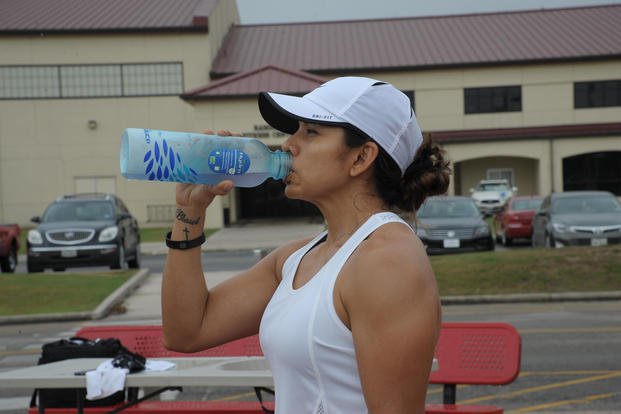If you ever have been dehydrated, you know the pain, lethargy and general inability to function it normally induces. Illness can lead to this level of dehydration, but so can long days in the heat, sports practice, manual labor or military missions.
Having enough water in your day is important to staying hydrated, but it isn't just lack of water that makes you feel less than optimal. A loss of electrolytes contributes the most. Glucose and electrolyte imbalances and loss of water produce mild symptoms of dehydration.
These include:
- Lethargy and sleepiness
- Thirsty (mild to excessive)
- Dry skin and mouth
- Constipation
- Dizziness
- Headache
As dehydration worsens, you will advance into more dangerous phases:
- Stop sweating
- Higher heart and breathing rate
- Fever
- Sunken, dark eyes
- Dark urine
- Lower blood pressure
- Heatstroke
- Death
Whether it's maintaining normal body functions, performing at a high activity level, enduring hot, humid and arid environments or getting over illness, the composition of water, salts and sugars in your body is critical to your success in these endeavors.
For instance, have you ever had the flu and spent a few days vomiting and enduring diarrhea? Usually, the day that someone finally can keep down and digest water and food, they have a big bowl of chicken noodle soup. Chicken noodle soup is loaded with sodium and potassium -- both are electrolytes -- and it contains macronutrients: proteins, carbs and fat. This replenishment of electrolytes is key to feeling better.
I have been treating recovery from dehydration due to illness and high physical output in the heat the same way for years. I drink the amount of water I lost, but I consume plenty of salts -- sodium, potassium, magnesium -- that also were sweated out during two-plus-hour physical events. I'm talking about the kind of events that require special levels of rehydration where you can wring out the sweat from your clothes (humid environments) or you have salt stains on them (arid/desert climate).
You can't just drink water in these conditions, or you could suffer from hyponatremia or water intoxication. Hyponatremia occurs when you don't have enough sodium in your blood. Typical stories of this occurring usually come from long endurance races, such as marathons and triathlons, when athletes sweat profusely for hours but only rehydrate with water. Not replacing electrolytes can lead to kidney damage and actually can kill you in these conditions. Other instances of hyponatremia occur when people consume too much water in a short period of time, such as a few gallons in an hour.
Being on a constant search for rehydration and sports recovery products, I have found moderate successes with sports drinks on the market (Gatorade, Powerade, etc.), but I either felt like I was consuming too much sugar or too much fake sugar. This is not a very scientific approach to rehydrating, and the subject could use a more serious approach.
Research in the area of rehydration has led me to seeing how developing countries fight dangerous diseases, such as dysentery, chronic diarrhea and other dehydration symptoms of illness. I also found how the U.S. Special Operations community fights dehydration in the deserts and high-mountain plains during deployments and training. The research led me to an easy-to-use, single-use powder package called DripDrop. This is a medical grade product that can be found at Amazon.com or www.dripdrop.com. The reasons why groups such as MARSOC and Army Special Forces use DripDrop can be read in the links provided below:
But the most telling use of its effectiveness is the doctors who take on humanitarian missions around the world. Allowing an ill person to rehydrate gives them a fighting chance; often the symptoms of dysentery, cholera, malaria, Ebola and others will kill you before medication takes effect.
DripDrop founder Dr. Eduardo Dolhun personally delivered the product to disaster areas where he donated his time and medical expertise. Dolhun brought DripDrop to Haiti, Pakistan, the Philippines, Uganda and Malawi.
After trying DripDrop for the past several workouts and dealing with the stomach flu, I can see why groups such as UNICEF, the World Health Organization and military special operations communities recommend it over water or sports drinks that have too much sugar and not enough salts.
Stew Smith is a former Navy SEAL and fitness author certified as a Strength and Conditioning Specialist (CSCS) with the National Strength and Conditioning Association. Visit his Fitness eBook store if you're looking to start a workout program to create a healthy lifestyle. Send your fitness questions to stew@stewsmith.com.
Want to Learn More About Military Life?
Whether you're thinking of joining the military, looking for fitness and basic training tips, or keeping up with military life and benefits, Military.com has you covered. Subscribe to Military.com to have military news, updates and resources delivered directly to your inbox.



















